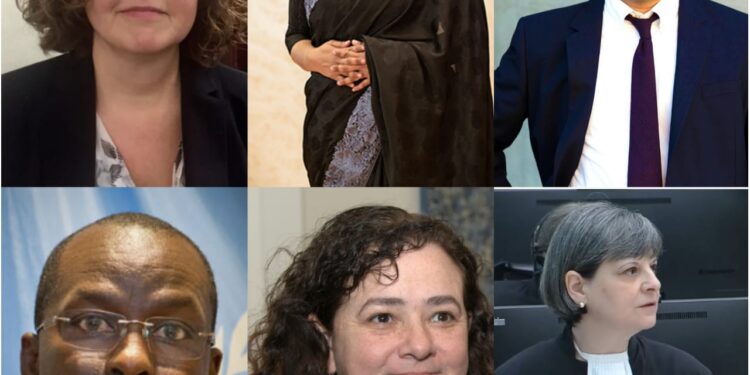By Janet Sankale
janet.sankale@jfjustice.net
Six candidates have been shortlisted for the position of Deputy Prosecutor of the International Criminal Court.
ICC Prosecutor Karim Khan QC presented two lists of the candidates to Silvia Fernández de Gurmendi, the president of the Assembly of States Parties (ASP) to the Rome Statute, the court’s founding treaty. The ASP will make the ultimate selection of the two deputies, one for investigations and one for prosecutions.
Listed here are the profiles of the six candidates, outlining a summary of their professional experience.
Sylvia Domaradzki
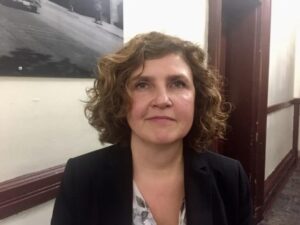
Sylvia Domaradzki started her career as a lawyer in 2002 and has served as a Crown Prosecutor in Canada since 2004. She has been the lead prosecutor of child exploiting cases, including cybercrime offences, and has worked with vulnerable victims and witnesses.
She has successfully prosecuted cases involving charges of homicide (first, second, and attempted), kidnapping, hostage-taking, complex fraud, and arson. She has also conducted numerous jury trials and dealt with complicated legal arguments, including expert evidence (including competing opinions), forensic (computer, DNA, fingerprint, and reconstruction), wiretap evidence, and different privileges (informant, solicitor/client).
As a Crown Prosecutor, Domaradzki formed an internet child prosecution (ICE) unit in her office in 2008, where she handled files at all stages of proceedings, from investigation to ultimate disposition. She is well trained and versed in handling digital evidence-based files.
She is conversant with the international setting, having collaborated with international prosecutors on issues of human trafficking when she attended the NAAGTRI fellowship (US) in 2011. In addition, she has enrolled in a Master of Laws programme at the University of London to help improve her capabilities in international best practices.
She has contributed a chapter on the issue of indigenous offenders in a book on Canadian criminal law and published a paper on the issue of human trafficking.
She has been invited to present at various conferences, including the IACSA Child Interviewer Training, Victim & Survivors of Crime Week (testimonial accommodations for young witnesses in court), Police Victim Services BC (Cyberbullying), Canadian Police College (Computer Forensics), Royal Canadian Mounted Police (RCMP) Pacific Region Training Centre (Computer Forensics, child interviewing), BC Crown Counsel conferences, and NS Public Prosecution Service.
She served as an English instructor in Seoul, South Korea, for the Foreign Affairs Department, Government of Korea.
Domaradzki previously worked at the Nova Scotia Prosecution Service (2006-2017) as a digital evidence resource counsel for the province and was part of the provincial Crown Sex Assault Working Group to formulate best practices when handling sex assault prosecutions.
She is an Accredited Facility Dog liaison Crown working with victim services and canine support systems and has been asked to contribute to the draft Curriculum for Child Abuse Prosecution Training.
She has received the Crown Recognition Award (BC) and has been commended by the superintendent of the RCMP in Nova Scotia for the work that she has done in the field of ICE.
Nazhat Shameen Khan
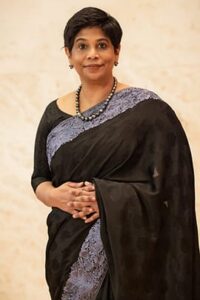
Nazhat Shameen Khan, who has more than 30 years of experience as a practitioner in criminal law, is the president of the United Nations Human Rights Council (HRC) in Geneva for the duration of 2021.
Since May 2014, Khan has been the Permanent Representative of the Republic of Fiji to the United Nations in Geneva, Switzerland, and Vienna, Austria, and ambassador to Switzerland.
Khan lists a number of firsts in her résumé – first woman in Fiji to be appointed a Crown Prosecutor, first woman to become the Director of Public Prosecutions, and first woman to be appointed a High Court judge.
Prior to her diplomatic appointment, she was a private legal practitioner and legal consultant in Fiji, operating as Nazhat Shameem Consultant since May 2009.
Before then, she had served as a prosecutor for 16 years. She was appointed Director of Public Prosecutions (DPP) in 1994 and High Court judge in 1999, a position she held until 2009.
She has experience in prosecuting and trying sexual and gender-based crimes, as well as offences against children. As Director of Public Prosecutions, she created the Sexual and Gender-Based Crime Unit in the Office of the DPP.
In addition, she led the implementation of innovative and child-friendly initiatives in the criminal justice system as the chairperson of the Children’s Coordinating Committee of Fiji, which was set up to implement the Convention of the Rights of the Child in national laws and policies.
“In my capacity as DPP I led transformative practices which resulted in the removal of unequal and discriminatory practices in the workplace, thus enhancing the quality of professional opportunities for women prosecutors and for prosecutors who experienced intersectional forms of discrimination. I have played a leadership role in designing, and implementing sexual harassment policies for law offices and the civil service, in Fiji,” Khan says.
During her time in private practice between 2009 and 2014, she conducted legal and corporate training for lawyers, judges, and the business community on human rights, corporate and good governance, and law and procedure.
Her ambassadorial duties at the UN include providing advice to the Government of Fiji and its agencies on human rights commitments and implementing human rights conventions and protocols in accordance with international obligations.
She has a Bachelor of Arts in Law from the University of Sussex, United Kingdom, a Master of Law from the University of Cambridge, and a Master of Philosophy in criminology from the University of Cambridge. She was called to the Bar as Barrister of England and Wales of Inner Temple in July 1983.
Paolina Massida
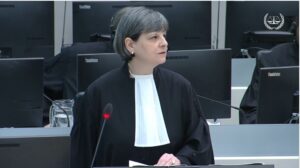
Paolina Massida has been the Principal Counsel in the Office of the Principal Counsel for Victims (OPCV) at the International Criminal Court since its creation in 2005.
Before joining the ICC, she practised law before national and international tribunals, representing accused and victims between 1991 and 2003.
From 1992 to 1993, she worked as a delegate based in Tirana (Albania) for the International Federation of the Red Cross. Her tasks included assistance to restructuring the Albanian Red Cross; developing plans and assistance programmes on a five-year basis; teaching international humanitarian law (IHL) at the University in Tirana, schools, and the military; assisting the Albanian Government in the ratification and implementation of the Geneva Conventions and the Additional Protocols.
In 2002, she worked as an associate legal officer in chambers at the International Criminal Tribunal for the former Yugoslavia (ICTY) in the Stakić, Brđanin, and Talić cases.
In 2003, she was a member of the Barayagwiza defence team (media trial) at the International Criminal Tribunal for Rwanda (ICTR) in Arusha.
She has also provided extra-judicial consultancy on issues related to criminal law, international humanitarian law, and human rights law.
She has 27 years of experience in criminal law, having practised in the field of international criminal law defending accused and victims for 19 years.
As Principal Counsel she established the first office ever created to assist and represent victims before an international tribunal, as well as support and assist external lawyers representing victims. For supporting external legal representatives, she created a database of researches on a number of topics of substantive and procedural law updated regularly with the latest jurisprudence and doctrine.
She also created and published a manual for legal representatives (first published in 2010 and updated yearly).
She represents daily in a courtroom the views and concerns of victims participating in the proceedings.
She has represented a group of victims in the first-ever trial before the ICC in the Lubanga case, contributing to enhancing the rights of victims in the proceedings at a time when all provisions of the Rome Statute were to be interpreted and applied for the first time and has consequently represented groups of victims in practically all cases and situations before the ICC. These include the Ongwen, and Yekatom and Ngaïssona cases as the common legal representative of victims; the Lubanga and Katanga reparations proceedings; the Gaddafi, Kony, and Simone Gbagbo cases; as well as the situations of the Registered Vessels, the Islamic Republic of Afghanistan and in the State of Palestine.
Other cases include Gbagbo and Blé Goudé; Bemba; and Ruto and Sang for the admissibility proceedings.
She has been an adviser to the Italian army for the application of IHL in armed conflicts since 1999 and is a founding member of the International Criminal Court Bar Association, where she has served in the Executive Committee, the Victims Committee, and the Professional Standards Advisory Committee.
She has published extensively on matters related to international criminal law and the rights of victims and she is a member of the editorial staff of several legal reviews. She has also been a member of the Italian Red Cross since 1989.
She holds a law degree from the University of Genova (Italy), a master’s in international criminal law, and specialisation in human rights. She was admitted to the Genoa Bar (Italy) in 1994.
Mame Mandiaye Niang
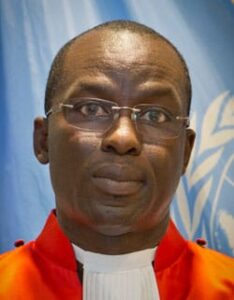
Mame Mandiaye Niang is the Prosecutor General of the Appeals Court of St Louis in Senegal and has been a judge since 2020.
He has 34 years of experience in domestic, international, and national experience and has served in the ad hoc tribunals as a senior legal officer.
He served as a trial attorney (1993 -1997) at the Prosecutor General of the Supreme Court of Senegal where he conducted legal research, wrote briefs, and made oral submissions before the highest court of the country.
He was a member of the investigating team (1997-2000) of the ICTR in Rwanda tasked with collecting evidence on genocide, crimes against humanity, and serious violations of Article 3 common to the Geneva Conventions of 1949 and Additional Protocol II.
In 2011, he served as the United Nations Office on Drugs and Crime (UNODC) regional representative for Southern Africa. He was elected judge of the ICTY and ICTR in 2013, where he sat in both the trial and appeals divisions.
He served as the Director of Criminal Affairs and Pardons in Senegal’s Ministry of Justice (2016-2020), where he provided legal advice to the government, did normative work on criminal laws, and drafted and negotiated treaties on behalf of the government.
He was a member and reporter of the Senegalese Law Revision Commission and an expert member of the Senegalese Committee of Human Rights, as well as a member of the Senegalese section of the International Association of Criminal Law.
He lectured in criminal law at the Ecole Nationale des Assistants et Educateurs Spécialisés (Training School for Educators and Welfare Officers); and was an expert, resource person of the Réseau Africain pour le Développement Intégré and the Senegalese Centre de Formation Judiciaire.
He was a visiting lecturer of international humanitarian law at the Université du Rwanda and at the Senegalese Centre de Judiciaire.
He has published over 20 articles in selective law reviews both in English and French, and also co-authored several books in international humanitarian law.
He is a statutory member of the Conseil Supérieur de la Magistrature (Senegal’s governing body of the judiciary), where he takes part in appointments and promotions, and sits at disciplinary proceedings against members of the judiciary.
Claudia Paz y Paz Bailey
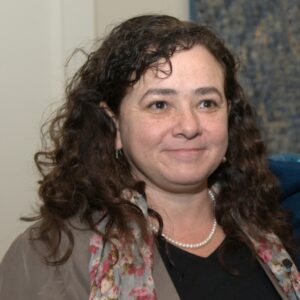
Claudia Paz y Paz Bailey is a director of the Mexico and Central America Programme of the Centre for Justice and International Law (CEJIL), which represents thousands of victims in the inter-American system of human rights, who have suffered gross human rights violations including massacres, genocide, extrajudicial executions, forced disappearances, and sexual violence.
She was a member of the Interdisciplinary Groups of Independent Experts for Mexico (2015-2016, 2020-2021) and Nicaragua (2018) to investigate serious human rights violations.
She was appointed as Guatemala’s first female Attorney General (2010-2014), putting her in charge of strategically directing the institution, developing the criminal prosecution policy, and overseeing investigations and prosecutions in high-impact cases, including cases of gross human rights violations, organised crime, and gender violence. Her main achievement was to design and implement the strategic criminal prosecution model that surpassed the case-by-case investigation and investigated the criminal phenomenon.
Her priority was to guarantee gender-based violence survivors protection and access to justice, where she led the implementation of a comprehensive care model that coordinated medical, psychological, social care, and forensic and investigatory teams, operating 24 hours a day, 365 days a week in the same location of attendance.
She was appointed Secretary for Multidimensional Security for the Organisation of American States (OAS) (Washington DC, 2017-2018), where she promoted and coordinated cooperation among the OAS member states and made efforts to promote the inter-American system; advised, prevented, confronted, and responded to threats that affected regional security.
She has practiced as a criminal law professor and a human rights defender and was the director of the Guatemalan Institute of Comparative Law (ICCPG -2002-10).
She was a researcher at the Historical Clarification Commission of Guatemala, an entity sponsored by the United Nations and established within the peace treaties, where she prepared the chapter on the Crime of Genocide in the report Guatemala, Memoria del Silencio.
She was also the legal adviser for the Guatemalan Office of Human Rights, of the Guatemalan Archbishop’s Office (1993-1994).
She has previously served as a justice of the peace in the city of Sumpango, and a small rural community of Guetamala (1991).
She was awarded an honorary Ph.D. by Georgetown University in Washington DC in 2015.
She has a Master’s in Law and Social Sciences (lawyer and public notary) from Rafael Landivar University (Guatemala, Guatemala, 1992) and a Ph.D. in Human Rights and Criminal Law from the University of Salamanca (Salamanca, Spain, 2006) with the doctoral thesis, The Criminal Protection of the People: Special Consideration on the Crime of Genocide.
She has several publications to her name, including four books and several articles on criminal law and gender.
She has been recognised several times for her work. In December 2011, Newsweek honoured her as one of the bravest women in the world. Forbes Magazine named her in August 2012 as one of the women who are changing the world in terms of public policy, due to the fight against organised crime and the increase in the number of prosecutions and convictions. In March 2013, Newsweek distinguished her among 125 women having an impact on the world due to her efforts in the fight against organised crime. She was named Woman of the Year by the magazine, Contra Poder, January 4, 2014.
Others include recognition awarded by the Drug Enforcement Administration (DEA) of the US Justice Department for arresting drug traffickers Mauro Salomon Ramirez Barrios, Juan Alberto Ortiz, and Waldemar Lorenzana Chamale and success in operations during 2011, and recognition granted by the Governor General of Canada for the work made to achieve progress in the reform of the justice system, improving access to justice, and strengthening the Public Ministry, in December 2012.
Alex Whiting
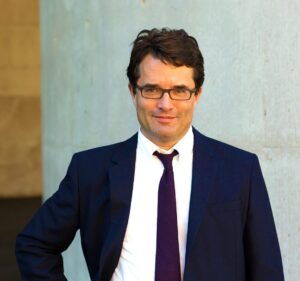
Alex Whiting is the Deputy Prosecutor at the Kosovo Specialist Chambers in The Hague. He has extensive national and international experience both in investigation and prosecution.
He has led investigations and prosecutions at the International Criminal Tribunal for the former Yugoslavia (ICTY) and at the International Criminal Court (ICC).
Between 2010 and 2013, he was in the Office of the Prosecutor at the ICC where he served first as Investigations Coordinator, overseeing all investigations, and then as Prosecutions Coordinator, overseeing all prosecutions.
Prior to joining ICC, he was an Assistant Clinical Professor of Law at Harvard Law School (2007-2010).
Between 2002 and 2007, he worked for the ICTY, where he was the lead prosecutor in the trial of Fatmir Limaj, Isak Musliu, and Haradin Bala, and lead prosecutor in the trials of Milan Martić and Dragomir Milošević.
Before ICTY, he had served as a federal prosecutor in Washington, DC, and Boston, focusing on criminal civil rights and organised crime investigations and prosecutions.
He is a visiting prosecutor at the Harvard Law School, where he teaches and writes in the field of international criminal law.
He is a graduate of Yale College and Yale Law School.
Read More: ICC-ASP20-DPROS-Shortlist-ENG (1).pdf


